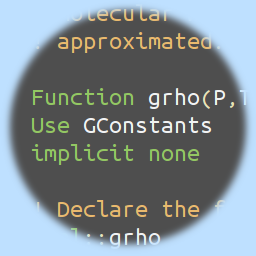
- #Simply fortran review update#
- #Simply fortran review manual#
- #Simply fortran review full#
- #Simply fortran review code#
) Planned features (or: "more limitations")
Support for CUDA Fortran attributes(global) (array and scalar arguments),Īnd attributes(host,device), attributes(device) procedures (only scalar arguments supported for the latter). Overloaded intrinsics: allocate, allocated, deallocate, deallocated, =. Kernel and loop constructs: !$cuf kernel do. Majority of CUDA libary functionality via HIPFORT. Support for !$acc routine seq functions with scalar arguments. In subsequent line, !$acc parallel loop, !$acc loop Kernel and loop constructs !$acc kernels plus !$acc loop in subsequent line, !$acc kernels loop, !$acc parallel plus !$acc loop. #Simply fortran review update#
Synchronization directives: !$acc wait, !$acc update self/host/device. Translation of data directives: !$acc enter data, !$acc exit data, !$acc data. #Simply fortran review code#
Until then, you have to modify your code manually to circumvent the above limitations. We are currently investigating what workarounds could be automatically applied. The names of the components are irrelevant for interoperability."
"Every component must be of interoperable type and kind and may not have the pointer or allocatable attribute. "Derived types with the C binding attribute shall not have the sequence attribute, type parameters, the extends attribute, nor type-bound procedures.". Please be aware that the interoperability of C structs and Fortran derived types is quite limited To interface generated HIP C++ kernels with the original Fortran code, GPUFORT relies on the iso_c_binding interoperability mechanisms that were added to the Fortran language with The development of GPUFORT is steered by the requirements To code formats that are well supported by AMD's ROCm ecosystem. GPUFORT was developed to translate a number of HPC apps #Simply fortran review full#
GPUFORT does not implement the full OpenACC standard (yet).We simply have not started to implement much in this direction yet. While both would be possible as the translator works with a tree structure, GPUFORT does a bad job in reorganizing loops and assignments in order to maximize.GPUFORT does a bad job in analyzing what code parts can be offloaded and which ones not.(We plan to add the option to prescribe a user-specified syntax checker tool.)

That developers apply GPUFORT to code that can be run correctly on CUDA devices. GPUFORT does only perform a small number of syntax checks as we assume
GPUFORT assumes syntactically and functionally correct input. Written in python3, GPUFORT can be developed at a quick Given that all code and especially the grammar is However, we believe GPUFORT can develop into anĮarly-outlining compiler if enough effort It's main purpose is to be a translator that allowsĪn experienced user to fix and tune the outcomes GPUFORT is not intended to be a compiler. Gives an overview of GPUFORT's building blocks. Please take a look at the (slightly outdated) user guide. #Simply fortran review manual#
We want to stress that the code translation and code generation outputs producedīy GPUFORT will in most cases require manual reviewing and fixing. We believe that it might be helpful for some. Note that a OpenACC runtime is only necessary for translatingĪn overview of the different translation paths that we work on is shown below: With hipfort or a combination of hipcc and gfortran. The result of the second translation process can be compiled The result of the first translation process, can be compiled Fortran+OpenACC and CUDA Fortran -> Fortran + + HIP C++.

 Fortran+OpenACC and CUDA Fortran -> Fortran + OpenMP 4.5+. This project develops a source to source translation tool that is able to convert:
Fortran+OpenACC and CUDA Fortran -> Fortran + OpenMP 4.5+. This project develops a source to source translation tool that is able to convert:







 0 kommentar(er)
0 kommentar(er)
